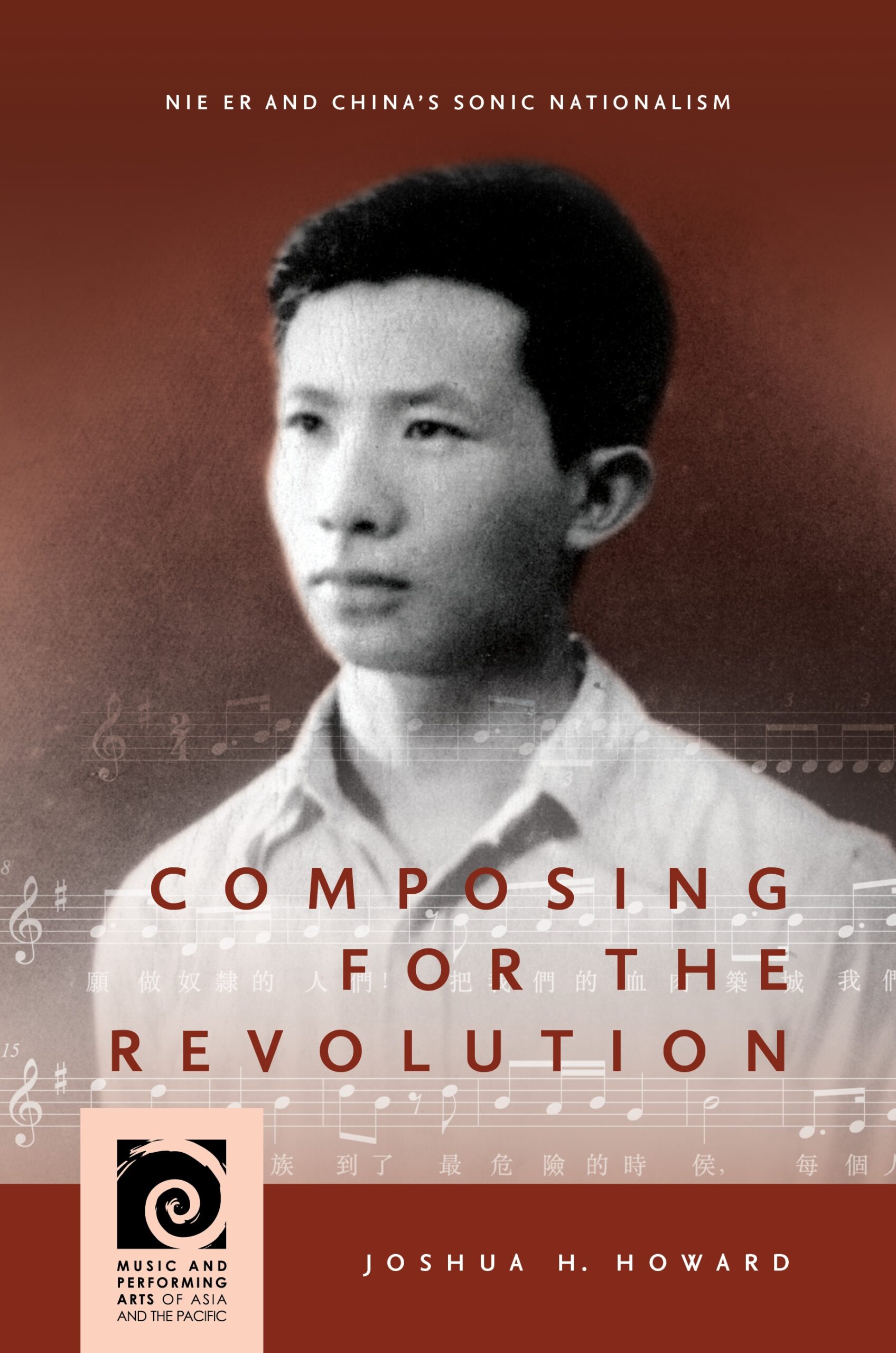Composing for the Revolution: Nie Er and China’s Sonic Nationalism
- About the Book
-
In Composing for the Revolution: Nie Er and China’s Sonic Nationalism, Joshua Howard explores the role the songwriter Nie Er played in the 1930s proletarian arts movement and the process by which he became a nationalist icon. Composed only months before his untimely death in 1935, Nie Er’s last song, the “March of the Volunteers,” captured the rising anti-Japanese sentiment and was selected as China’s national anthem with the establishment of the People’s Republic. Nie was quickly canonized after his death and later recast into the “People’s Musician” during the 1950s, effectively becoming a national monument.
Howard engages two historical paradigms that have dominated the study of twentieth-century China: revolution and modernity. He argues that Nie Er, active in the leftist artistic community and critical of capitalism, availed himself of media technology, especially the emerging sound cinema, to create a modern, revolutionary, and nationalist music. This thesis stands as a powerful corrective to a growing literature on the construction of a Chinese modernity, which has privileged the mass consumer culture of Shanghai and consciously sought to displace the focus on China’s revolutionary experience.
Composing for the Revolution also provides insight into understudied aspects of China’s nationalism—its sonic and musical dimensions. Howard’s analyses highlights Nie’s extensive writings on the political function of music, examination of the musical techniques and lyrics of compositions within the context of left-wing cinema, and also the transmission of his songs through film, social movements, and commemoration. Nie Er shared multiple and overlapping identities based on regionalism, nationalism, and left-wing internationalism. His march songs, inspired by Soviet “mass songs,” combined Western musical structure and aesthetic with elements of Chinese folk music. The songs’ ideological message promoted class nationalism, but his “March of the Volunteers” elevated his music to a universal status thereby transcending the nation.
Traversing the life and legacy of Nie Er, Howard offers readers a profound insight into the meanings of nationalism and memory in contemporary China. Composing for the Revolution underscores the value of careful reading of sources and the author’s willingness to approach a subject from multiple perspectives.
- About the Author(s)
-
Joshua H. Howard, Author
Joshua H. Howard is the Croft Professor of History and International Studies at the University of Mississippi.Frederick Lau, Series Editor
Frederick Lau is the chair and professor of ethnomusicology and director of the Center for Chinese Studies at the University of Hawai‘i at Mānoa.
- Reviews and Endorsements
-
- With a deeply textured reading of sources, theories, and history, Joshua Howard’s Composing for the Revolution is the first substantial treatment in English of the Chinese composer Nie Er. It also is one of the first in any language to take seriously Nie Er’s Marxism as a fully important part of his musical practice. This book embeds Nie Er in the social, ideological, and political milieus of 1920s–1930s China, while excavating what was unique about his upbringing and training. A must-read for anyone concerned with modern history, and particularly with how classical music, folk songs, and revolution were linked in China’s early twentieth century.
—Rebecca E. Karl, Professor of History, New York University The musician scholar Joshua Howard has written the first English-language biography of Nie Er, the young communist composer of anti-imperialist and revolutionary songs in wartime China. This honest and brilliant portrayal cannot be timelier when tracing the lost world of class nationalism and internationalism and is inherently a critique of contemporary neo-nationalist and globalist fantasies. Striking lyric and sonic similarities between “March of the Volunteers” (the national anthem of the PRC) and the “Internationale” by the rhythms of the exploited and oppressed are powerfully symbolic of the depth of a history emerging from these lucid pages. They challenge our own denial and complicity.
—Lin Chun, Professor in Comparative Politics, The London School of Economics and Political Science- This book represents new research on and interpretation of China’s socialist musical icon Nie Er, whom the renowned PRC politician and poet Guo Moruo hailed “People’s Composer.” Not only does the volume draws attention to overlooked incidents of the composer’s life in Yunnan and Shanghai, but it also sheds light on his songs, including the national anthem “The March of the Volunteers.” Into the uncharted territory of the composer’s reception history, it unravels the many layers of negotiations in China’s quest for sonic nationalism, revealing how a deceased composer has become a state musical brand consumed by different stake-holders for different purposes beyond just the rhetoric of ideology.
—Hon-Lun Helan Yang, Professor of Music, Hong Kong Baptist University
- With a deeply textured reading of sources, theories, and history, Joshua Howard’s Composing for the Revolution is the first substantial treatment in English of the Chinese composer Nie Er. It also is one of the first in any language to take seriously Nie Er’s Marxism as a fully important part of his musical practice. This book embeds Nie Er in the social, ideological, and political milieus of 1920s–1930s China, while excavating what was unique about his upbringing and training. A must-read for anyone concerned with modern history, and particularly with how classical music, folk songs, and revolution were linked in China’s early twentieth century.
- Supporting Resources
-





